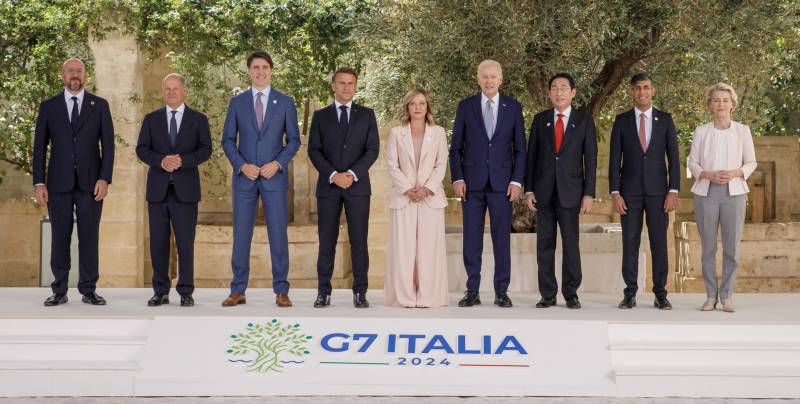
Italy hosted the G7’s 50th annual summit in the southern Italian region of Puglia, from June 13-15.
What is the G7?
The G7 is a policy coordination forum that comprises the world’s largest “advanced economies” – the United States, Canada, Japan, Germany, France, Italy and Britain. The European Union is a participant in all discussions, so the Presidents of the European Council and the European Commission also attend each submit.
The G7 was cobbled together in the wake of the chaos created by the collapse of the Bretton Woods monetary system and the oil embargo put in place by OPEC (the Organization of Petroleum Exporting Countries).
Today, the G7 member states comprise nearly 40% of global GDP, or nearly $40 trillion, and 10% of the global population.
Russia joined in 1998, and the group was renamed the G8, until Moscow’s expulsion from the group in 2014 over the annexation of Crimea.
What were Erdogan and Modi doing there?
As per G7 custom, the host country can extend invitations to other guests to join some of the sessions. Italy invited Pope Francis, and the leaders of Ukraine, India, Brazil, Argentina, Turkey, the UAE, Kenya, Tunisia, Algeria and Mauritania – a rather extensive guest list.
This meant that despite India not being a member of the G7, Indian Prime Minister Narendra Modi and Turkish President Recep Tayyip Erdoğan were among the international heads of state present at the summit.
What was on the agenda for this year’s summit?
The G7 summit was due to discuss a rather exhaustive list of global issues this year, including climate change, migration development, the war in Ukraine and economic security.
Pope Francis became the first pontiff to address a G7 summit, and used his moral authority to suggest a humane approach towards artificial intelligence and urged a global ban on lethal autonomous weaponry. The Pope said that “no machine should ever choose to take the life of a human being.”
What came of the summit?
The G7 leaders renewed their pledge to support Ukraine in its fight against Russia and announced that they would make around $50 billion available to Ukraine, some of it by leveraging the “the extraordinary revenues” from frozen Russian assets.
Somewhat unsurprisingly, right-wing Italian Prime Minister Giorgia Meloni’s conservative politics meant that there was no mention of abortion in the final communique released after the summit, after the AP reported that Meloni’s government worked to water down references to reproductive choice.
The G7 also pledged to launch an initiative to spur clean energy investments across Africa. The Energy for Growth in Africa initiative includes Ethiopia, Kenya, Mozambique, Nigeria, the Republic of Congo, South Africa and the Ivory Coast, and will involve a focus on developing clean energy infrastructure and supply chains.
G7 leaders also pledged to reduce dependence on fossil fuels to adhere to the 1.5 degrees Celsius limit for global warming.
Was China discussed?
Even though China is not part of the G7, it was a major presence at the meeting, with the Asian giant referred no less than 28 times in the final communique from the summit, in a significant change of tone. While China has previously been viewed by the G7 as a trading partner, that view seems to have hardened and shifted towards viewing China as a hostile force.
China was referred to as the “savior of Russia’s war machine” in the final communique, and as a malign economic actor that was dumping products like electrical vehicles in Western markets. The deepening Russia-China partnership was firmly in the group's crosshairs.
The G7 issued a warning to China against supporting Russia’s war effort, going as far as threatening sanctions and calling upon Beijing to “cease the transfer of dual-use materials, including weapons components and equipment, that are inputs for Russia’s defense sector.”
Even more attention was targeted at China’s industrial overcapacity, which according to the G7 is “leading to global spillovers, market distortions and harmful overcapacity in a growing range of sectors, undermining our workers, industries and economic resilience and security.”
Is the G7 still relevant?
Public and expert opinion around the world is unanimous in that international organizations are in decline, as the basic architecture of the international system, put in place in the aftermath of the second World War, is struggling to address the challenges facing the world today.
With the world gradually transitioning to multipolarity, states in the global South are disgruntled and dissatisfied with a financial, monetary and trading infrastructure that represents a few superpowers and their political and economic preferences.
The G7 has been accused of hypocrisy and double standards in their unequivocal support for Ukraine, in the face of muted support for Israel’s murderous conduct in Gaza.
The G7’s failure to adopt a stronger principled stance on Israel’s war in Gaza is seen as the clearest example of the West’s duplicity. The theme of the G7 summit this year was “rules based international system,” which seems ironic given that the G7 has not openly denounced Israel’s actions in Gaza, even as the Jewish state has slaughtered tens of thousands of innocent people in a matter of months.
Even though Ukraine and its right to self-defense were discussed fervently at the G7 summit, there was little substantive discussion of the ceasefire plan for Gaza proposed by the Biden administration on May 31.
